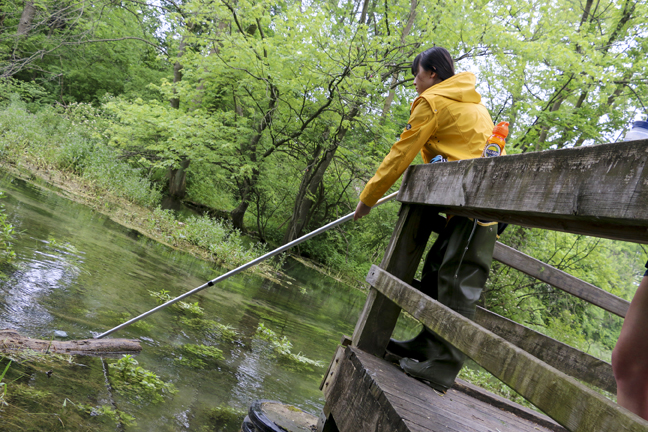Rated (G)reen

The Princeton Review’s Green Honor Roll considers institutional efforts to provide and develop an environmentally beneficial student experience. For 30 years, Dickinson’s Alliance for Aquatic Resource Monitoring (ALLARM) staff and student watershed coordinators have engaged communities to use science as a tool to investigate the health of their streams and to use the data they generate for aquatic protection and restoration efforts.
by Christine Baksi
Dickinson has again been named to The Princeton’s Review’s Green Honor Roll, a distinction awarded this year to only 21 colleges and universities across the country that attained a score of 99—the highest possible score—in Green Rating tallies. Dickinson is one of only three Pennsylvania institutions to be named to the honor roll and joins fellow EcoLeague members, College of the Atlantic and Green Mountain College, as well as Carnegie Mellon, Cornell and Stanford universities. Additionally, Dickinson was named to Sierra magazine's 2016 list of "Cool Schools," for environmental sustainability.
For its 2017 Green Rating, The Princeton Review scored 640 schools to provide a comprehensive measure of a school’s performance as an environmentally aware and prepared institution. Some of the information most valued in the ranking system considers a school’s local and organic food expenditures; the availability of mass transit programs or bike- and car-sharing programs; waste-diversion rates; percentage of energy consumption derived from renewable resources; LEED certification for new construction or building renovations; and academic commitment to integrating sustainability throughout the curriculum.
According to Neil Leary, director of the Center for Sustainability Education, 2015-16 was a year of broad and deep engagement for Dickinson in sustainability initiatives and studies from local to global.
Below are a few of the highlights:
On Campus
Eco-Reps reimagined: the peer-education program empowers Dickinsonians to make sustainable changes in their lives and work. It was reorganized to include students, faculty and staff, and to expand from serving students in residence halls to serving students within the context of athletic teams, clubs and organizations while also serving employees in their administrative offices and academic departments.
Sustain It: launched in fall 2015, Sustain It workshops on composting, building rain barrels, upcycling and more help create action on issues of concern through hands-on learning and networking.
Exploring Our Place: fieldtrips help us become more knowledgeable and responsible inhabitants of the places where we live, study, work and play. Sites visited included the LeTort Spring Run, local water and sewage treatment plants and the U.S. Army Heritage & Education Center.
Gather: a monthly pop-up restaurant that serves up a farm-to-table dining experience. Guest chefs prepare a meal for the Dickinson community using organic meats and produce from the College Farm. In September, Dickinson will welcome Hugh Acheson as guest chef.
Across Pennsylvania
Dickinson organized the PA Power Dialog in collaboration with several other Pennsylvania schools and the Pennsylvania Environmental Resource Consortium. The event—attended by 235 participants—was one of 30 Power Dialogs held in state capitals across the nation to bring college students together with regulators and legislators to learn from each other about state-level implementation of the federal Clean Power Plan.
Locally
Dickinson helped secure $60,000 in grant funding to implement Greater Carlisle Heart & Soul, a project that enables community members to learn the “heart and soul” of the community and to apply that knowledge in community planning and development.
Internationally
Dickinson sent a seven-person delegation of students, staff and alumni to the 21st Conference of the Parties (COP21) of the United Nations Framework Convention on Climate Change in Paris, where Dickinson organized an event with featured speakers and Rose-Walters Prize winners Bill McKibben and James Balog.
College Farm managers Matt Steiman and Jenn Halpin traveled to Israel and Kenya, meeting with the members of the Arava Institute, several Kibbutzim and other groups and learning about hydroponics, aquaponics, small scale biogas production, green building technologies and other sustainable practices and technologies. The trip has resulted in the installation of a home biogas unit at the Treehouse, which allows students to produce biogas for cooking from food waste, and it has also generated ideas for integrated courses, student exchanges and global studies opportunities.
Dickinson's innovations in curriculum and its leadership in sustainable campus operations consistently earn national recognition. The college has received the STARS Gold rating from the Association for the Advancement of Sustainability in Higher Education, garnered top marks on the Green Report Card of the Sustainable Endowments Institute, has been consistently rated a Cool School by Sierra Magazine and earned Second Nature's inaugural award for Institutional Excellence in Climate Leadership.
Learn More
Published August 30, 2016